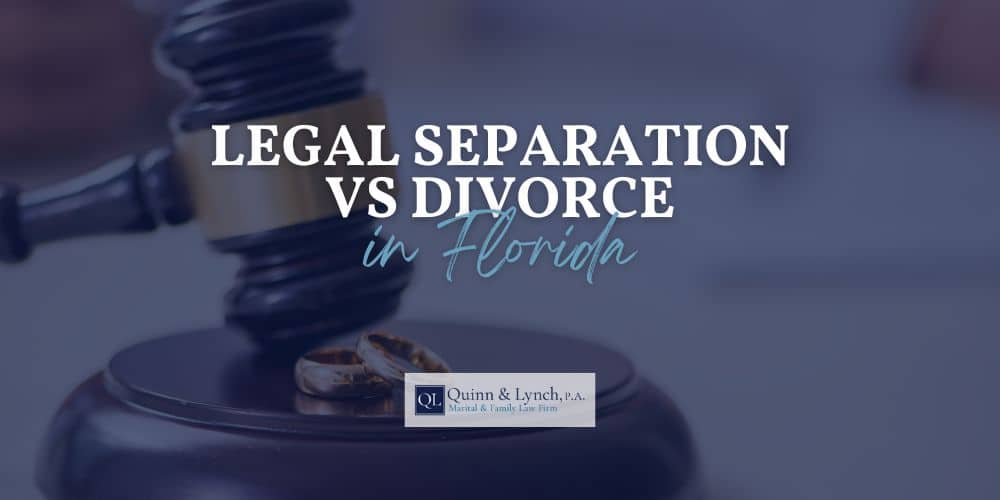What is the between divorce and legal separation in Florida? Divorce action legally ends the contract signed by the married couple, allowing parties who were previously legally married to move on and potentially remarry, while legal separation permits spouses to live apart and make necessary arrangements without sacrificing the benefits gained through being legally married.
If you’re considering a legal divorce or legal separation in Florida, the Tampa family law attorneys at Quinn & Lynch, P.A. are here to help you understand your options for legal action and navigate the legal process with confidence.
Legal Separation vs Divorce in Florida
Florida couples considering the end or redefinition of their marriage can choose between legal separations and divorce proceedings. As a no-fault divorce state, Florida allows couples to take divorce action without proving fault, making the divorce process easier in most cases.
To better understand the difference between divorce proceedings and legal separations in Florida, we’ll break down the divorce process into two parts:
- Division of the life of one spouse from the other. You and the other spouse divide everything. You must decide how to split marital assets and debt, parenting time, and take steps to live separate lives moving forward.
- The termination of the marriage itself. Certain benefits aren’t available for those who are not legally married. These shared benefits can include social security benefits, access to favorable health insurance, certain military benefits, or benefits of filing taxes jointly. Spouses just cannot marry another person. A legal divorce terminates these shared benefits.
Divorces include both parts, but legal separations only include the first.
Courts do not recognize legal separation in Florida, and there are no laws regarding legal separation in Florida statutes. This allows spouses to build separate lives, make formal arrangements for child custody and child support, and decide whether to share the marital home amicably or live separately without sacrificing the shared benefits.
However, for other states recognizing legal separation, once the couple separates, the division is as complete as divorce. Child support and custody are included in the court order granting the legal separation, and all marital assets, including the marital home, are separated. Property that one spouse acquires after a legal separation isn’t considered the marital home, even though, technically, the couple is married. The same applies to assets.
Why would someone want a legal separation in Florida?

Why Would You Get a Legal Separation Instead of a Divorce?
Opting for legal separation in Florida can be a strategic choice for many couples. Legal separation allows spouses to live separately while still reaping the benefits of a being a married couple.
Some spouses choose legal separation to retain health insurance benefits, military benefits, social security benefits, or other financial support associated with marriage. For example, if a spouse has a chronic or terminal condition that hinders their ability to get decent health insurance, the other spouse may prefer living separately as opposed to divorcing, especially if the couple has children.
Others may prefer to legally separate due to religious reasons or cultural beliefs.
Additionally, separation in Florida provides a structured way to handle issues such as child custody, child support, spousal support, and property division without the finality of divorce agreements.
Florida Does Not Recognize Legal Separation: What are the Options for Legal Separation in Florida
While Florida courts do not formally recognize legal separation, separated couples looking to live separately without ending their marriage still have several options to establish clear terms and protections.
Informal Separation Agreement
An informal separation agreement in Florida allows couples to establish terms for living apart without seeking a formal court order. This agreement can cover important aspects such as visitation rights, spousal support, child support, and division of marital assets, including the marital residence.
While not legally binding like a court order, an informal separation agreement can serve as a crucial tool for maintaining order and clarity for couples living separately.
For Florida couples choosing to legally separate, consulting with a Tampa property division attorney can help protect both parties’ interests.

Postnuptial Agreements
Postnuptial agreements are legal contracts entered into by spouses after they are married. A postnuptial agreement is typically designed to outline the division of assets, debts, and other financial support options in the event of a legal separation or divorce, addressing various issues, including property division, spousal support, marital home, and inheritance rights.
An experienced family law attorney in Tampa can help draft a postnuptial agreement that reflects the couple’s specific needs. Postnuptial agreements can also prevent future conflicts in the event that either spouse files for divorce.
Child Support
Child support is crucial to ensuring the well-being of children following a legal separation or divorce. It involves financial contributions from the non-custodial parent to cover essential expenses such as housing, education, healthcare, and everyday living costs.
Whether establishing new child support orders or modifying existing ones, a Tampa child support lawyer provides the expertise and advocacy needed to secure the financial support necessary for a child’s stability and growth.
Child Custody or Time Sharing
Florida courts allow couples to petition for child custody matters for separated couples. A Florida court can rule on issues of visitation, custody, and the child’s primary residence without the need to end the marriage. A Tampa time-sharing attorney can help parents file a Petition for Support Unconnected With Dissolution. This allows a Florida court to issue child support, spousal support, or alimony orders.
Spousal Support and Alimony Orders
Spousal support and alimony orders dictate financial payments made by one spouse to the other following a legal divorce. There are several types of alimony in Florida, with some being temporary and others being permanent alimony orders.
Our Tampa alimony attorneys can file a Petition for Support Unconnected With Dissolution for couples choosing separation in Florida.

Alternative Divorce Solutions
Our Tamp divorce lawyer team explores the most effective alternatives to divorce.
Collaborative Divorce
Here, both spouses work together alongside their own divorce lawyer to reach mutually beneficial agreements without going to court. A Tampa collaborative divorce lawyer can guide couples through this legal process. By choosing this alternative, both parties can maintain control over their decisions, protect their privacy, and potentially preserve a more positive relationship.
Mediated Divorce
This approach allows both spouses to openly discuss and agree on the division of assets, child support and custody, and spousal support, fostering cooperation and reducing hostility.
A Tampa mediated divorce attorney can facilitate the divorce proceeding by providing legal guidance and ensuring final agreements are fair and comprehensive.
How a Brandon and Tampa Family Law Attorney Can Help
Whether you are dealing with divorce, child custody, child support, alimony orders, or other family law matters, our Tampa and Brandon family law attorneys are here to guide you every step of the way.
To learn more about divorce and legal separation in Florida, contact our experienced attorneys by calling (813) 223-7739 or contacting us online.















